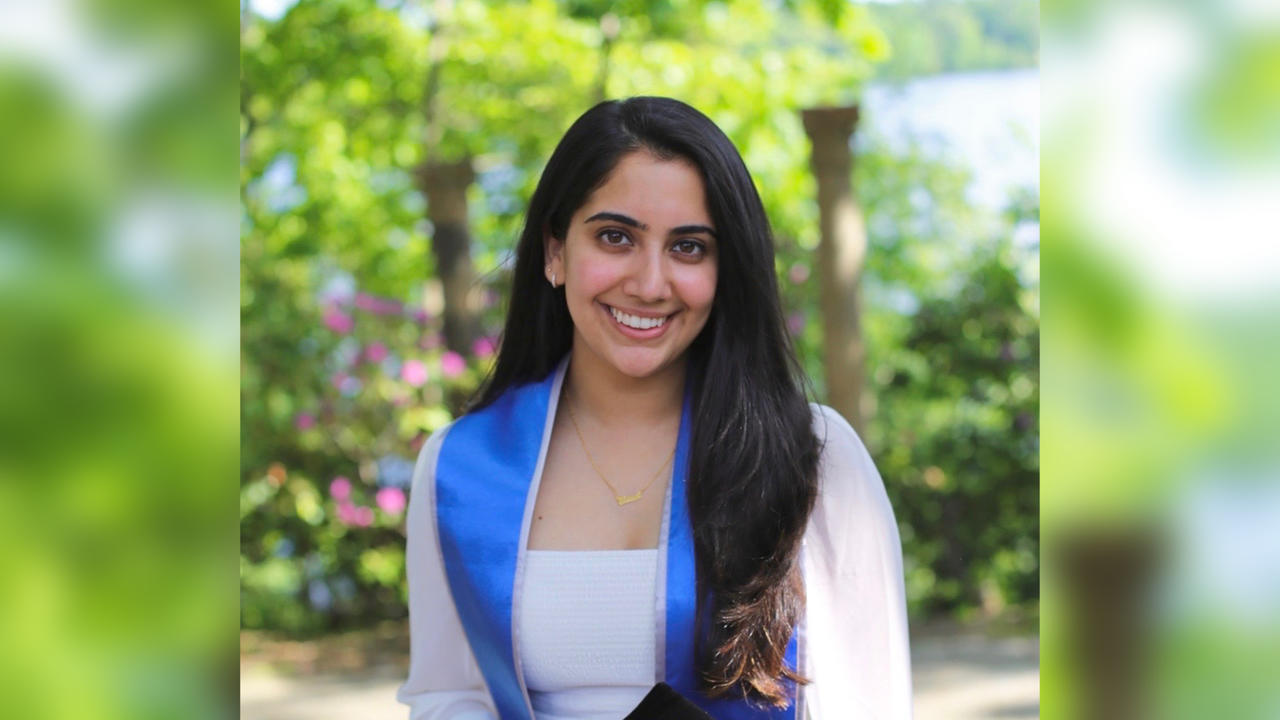Kismat Dhaliwal ’21, 2022 Charles B. Rangel International Affairs Fellowship Recipient

This story was originally published on April 4, 2022 as a Wellesley Spotlight.
Shirley Chisholm, the first Black woman elected to the U.S. Congress, once said, “If they don’t give you a seat at the table, bring a folding chair.” During an internship with a D.C. think tank, Kismat Kaur Dhaliwal ’21 saw firsthand the policymakers around the table, and she decided she wanted a seat there. As the recipient of a 2022 Charles B. Rangel International Affairs Fellowship, funded by the U.S. Department of State and administered by Howard University, she will have an opportunity to get closer to that goal. The fellowship provides support through a two-year graduate program, an internship with a member of Congress in summer 2022, and an internship next summer at a U.S. consulate or embassy.
As part of the think tank’s security and strategy team during the summer of 2019, Dhaliwal observed that the decision-makers were primarily white males whose decisions would affect countries populated by people who didn’t look like them. “Often women and children are used to build the pathos to justify certain decisions,” she said, “and I thought it was crazy to look around the table at who is making the decisions and [see that] those people are not represented at all.” She decided then that she wanted to “break into the national security and defense space.”
Wellesley has some famous diplomat graduates, and Dhaliwal’s father, a first-generation American, thought one of them in particular might inspire his daughter. He read a biography of Hillary Rodham Clinton ’69 in which she speaks about her experience at Wellesley. “My dad has actually wanted me to go to Wellesley since I was 3 years old,” she said. When the time came to apply for colleges, however, Dhaliwal thanked him for the input but assured him she could make up her own mind. “But after touring Wellesley, I just loved it,” she said. She connected with students over shared values and decided to apply early decision.
Dhaliwal had a bit of culture shock when she arrived on the East Coast from her home in Diablo, Calif.—she didn’t see large Sikh or Punjabi communities in the area, and the closest gurdwara, a place of worship for Sikhs, was a 40-minute drive from the College. She worked with Jackie Marquez, dean of religious and spiritual life, to create the Wellesley Sikh Student Association. “I feel like that was a really big part of my Wellesley experience,” she said, “because my Sikh identity has also been really tied to my interest in politics and the connections that I’ve been able to make.”
After having her epiphany as an intern, she turned to Wellesley alums—including some in the Sikh community—for guidance, and she worked with the Sikh American Legal Defense and Education Fund to build a network of Sikhs interested in politics and government advocacy. Since her selection as a Rangel fellow, members of the Sikh community have continued to reach out to connect and offer guidance.
The Rangel fellowship will allow Dhaliwal, who majored in political science, to pursue her dream of working in diplomacy, which she describes as the perfect intersection of her interests in foreign policy and politics and her curiosity about the world. She is also excited about the prospect of serving the U.S. abroad. “My great-great-grandfather fought for the British Army during World War II,” she said. “My grandfather fought with the U.S. Army in Vietnam. And I’m going to be able to also serve my country and be the first woman in my family to do so. I’m really excited about that.”
Dhaliwal said the Wellesley Career Education team and other alums who have received the Rangel Fellowship all helped her get to this point. “Honestly, I couldn’t have done it without the Fellowships Office. And it wasn’t even like I was just working with one person. It was a whole team effort,” she said. They helped her perfect her essay for the fellowship and her graduate school applications and provided moral support. The team told her that they want more Wellesley students in these fellowships and more Wellesley women in the foreign service, Dhaliwal said, “and so I’m excited to pay it forward.”
Kate Dailinger, director of fellowships, said Dhaliwal “represents the best of Wellesley, and we’re so lucky to have her doing that, striving toward a career of public service. Kizzy won’t just make space at decision-making tables for herself, she’ll pull up chairs for others, too.”


